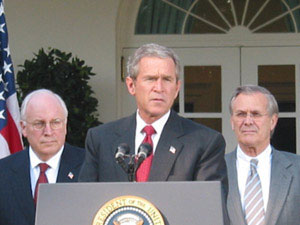Clarifying Moments of Warning and Invitation
For Sunday March 11, 2007
Third Sunday in Lent
Lectionary Readings (Revised Common Lectionary, Year C)
Isaiah 55:1–9
Psalm 63:1–8
1 Corinthians 10:1–13
Luke 13:1–9
 |
Floor of the New York Stock Exchange. |
On February 18th Vincenzo Giovannotto went to bed after a late phone call to confirm a family lunch with his sister. He never woke up. Vince died in his sleep of natural causes at the age of thirty-eight, leaving behind a wife and three young children. I didn't know Vince, although I often go by his house when I walk our dog. We had talked a few times. He always wore a baseball cap, never stood still when you talked to him, and sported vanity plates on his Ford Explorer ("Apt Guy") that he drove around the neighborhood managing his family's real estate properties. And now he's dead. I cut out his obituary from the local newspaper and keep looking at his picture, as if staring at it long enough might bring him back to life.
In Luke's Gospel this week Jesus responds to two stories of sudden and premature death that sound like something from the morning newspaper. When Pilate slaughtered some Galileans during their religious rituals (a reminder to all religious people enamored with political power), instead of blaming the governor some people blamed the victims and construed the tragedy as divine punishment. Similarly, in a bizarre accident of fate, when a tower collapsed and killed eighteen people in Siloam, some people concluded that they must have been "worse sinners" than the average person. Those still living suggested that in the moral calculus of the cosmos the dead deserved to die. Perhaps at some sub-conscious level they also thought that avoiding disaster signified God's approval of their lives. They were wrong on both counts.
 |
Bush, Cheney, and Rumsfeld. |
No, said Jesus, don't demonize your neighbor. Don't presume to invoke God's judgment on someone else. You can't purchase God's favor by projecting your fears and anxieties onto others. Then, as he often did, Jesus flipped the story so that its moral applied to the living rather than to the dead. Jesus compared his audience to barren fruit trees. Unlike my neighbor Vince, the Galileans, or the people of Siloam for whom time had run out, they still enjoyed a future with choices. If they let the tragedy speak to them, instead of using it in a vain attempt to validate their own status quo, they could rearrange the furniture of their lives, adjust their priorities, and make changes while life was left. But the window of opportunity would not stay open forever, Jesus reminded them. Mere longevity was no guarantee of a fruitful life, just as premature death could not diminish it. Sooner or later the tree would be cut down.
Thus in the Old Testament this week Isaiah asks, "Why spend money on what is not bread, and your labor on what does not satisfy?" (Isaiah 55:2). That is spiritual deficit spending of the worst sort, accumulating depreciating assets that lose more value every day. When the clock stops and time ends, Jesus said, your life will not consist of your possessions, the wealth you hoarded, the vanity you perfected, or the power you wielded. There's a deep hunger and thirst in all of us, says the Psalmist (63:1), a palpable longing for human nourishment and fulfillment that no amount of power or money, no prestigious job, nor any glamorous home in an upscale neighborhood can satisfy. Your anxieties will not disappear by winning the lottery tomorrow. A new lover will not bring true love.
For the most part we don't live like we believe Jesus or the Psalmist. For much of his young and successful life David Kuo didn't. Then things changed.
 |
New York City. |
Conservative Christians like Charles Colson and James Dobson have hammered Kuo for his new book Tempting Faith, in which he describes his firsthand experiences in George W. Bush's administration. In his first presidential campaign Bush promised to spend $8 billion per year on faith-based initiatives. As an earnest and talented evangelical, Kuo was euphoric, and in 2001 he joined the White House staff as a Special Assistant to Bush to help manage the new program. At long last, he thought, he had discovered a way to leverage political means to further Gospel ends.
Two years later Kuo resigned when he realized that the Bush administration had done "less than nothing" to fulfill its promises. The faith-based initiative, he discovered, was "a farce, a brazen deception, smear tactics, [and] a mirage." The grant application process was a sham that was probably illegal and unconstitutional. Instead of using political means to further Gospel ends, his Bush colleagues turned this on its head and played right wing evangelicals like a cheap violin to further their own political ends. In private, White House staffers derided evangelicals as dupes, nuts, and crazies. Evangelicals, Kuo concluded, had been deftly used and abused as a gullible gold mine of voters (over 80% of them voted for Bush), nothing more and nothing less. "We were good people, forced to run a sad charade, to provide political cover to a White House that needed compassion and religion as political tools."
 |
The Milan catwalk. |
But political exploitation was not the worst part, nor even the central point of Kuo's book, only about half of which deals with his days in the White House. Conservatives who feel betrayed by Kuo have missed his main emphasis, which is one not of political kiss-n-tell but of personal awakening that called for radical change. Most of Kuo's book is a candid and introspective memoir about his growing conviction about the corrosive nature of political power, where manipulation, fragile egos, exaggerated self-importance, broken marriages, propagandistic lies, and partisan ideology are the order of the day. Principled people with a conscience pay a heavy price to play that game of pragmatism. For Kuo, the price was too high; a divorce, disillusionment, remarriage, and surgery for a massive brain tumor at the age of thirty-four provoked a change of direction. So did his realization that the Gospel should subvert political power, and not vice versa.
"I let the passion of politics distract me from what matters most in life," he writes. Today Kuo is a professional bass fisherman. He says that he no longer cares about the adrenalin rush of White House power, feeling important because he was busy, how close his office was to the president, or what people think of him. Brain tumors and divorces, he says, "help one to clarify things. That's why I wrote this book."
For further reflection
* What have been some of the "clarifying moments" in your life?
* Why are so many clarifying moments experiences of pain, suffering, and loss?
* Consider Paul's words from this week's epistle: "So, if you think you are standing firm, be careful that you don't fall" (1 Corinthians 10:12).
* Meditate on Jesus's words from this week's Gospel: "Unless you change, you too will perish."
* See David Kuo, Tempting Faith (2006).





